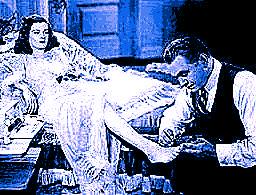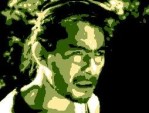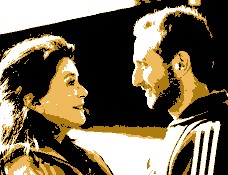Film Review

Not only is Scarlet Street extremely well directed and shot with consummate skill, it also boasts some of the best performances of any classic American film noir. The film's three lead actors - Edward G. Robinson, Joan Bennett and Dan Duryea - work together remarkably well, having appeared together in an earlier Fritz Lang film, The Woman in the Window (1944). Robinson is a perfect casting choice - he had a knack of portraying ordinary characters truthfully and without overplaying the pathos, but he was also just as adept at playing evil (something he originally put to good use in his early gangster roles, in films such as Little Caesar). Robinson's deceptive air of childlike innocence is effectively contrasted with the cruel venality of Joan Bennett's femme fatale. Watching the scheming Bennett manipulate Robinson is like watching a cat toying with a mouse, just before the coup de grâce is applied.
Fritz Lang's origins in German expressionist cinema are apparent in the way he develops film noir technique in his films. Whilst Lang never returned to the true, highly stylised expressionism of his early silent films (Dr Mabuse, der Spieler (1922), Spione (1928), M (1931)), he retained a penchant for harsh lighting, unusual camera angles and shadow play. This can be seen most readily in the final sequences of Scarlet Street, where the familiar expressionistic devices allow Lang to achieve economy on both narrative and set design whilst heightening dramatic impact. There could hardly be a more effective way of showing the central character's descent into Hell than to have the shadows engulf him and drag him towards his tragic destiny, making this an ingenious and brutal reinterpretation of the famous Faust legend, in which a man sells his soul to possess the one thing he can never have - love.
© James Travers 2008
The above content is owned by frenchfilms.org and must not be copied.
Film Synopsis
Mild-mannered store cashier Chris Cross relieves his humdrum life by painting in his spare time, which is just one of the things that irks his shrewish wife. One night, after attending a dinner in his honour, Chris comes to the aid of a young woman who is apparently being attacked by a man. The woman, Kitty March, accepts Chris's offer of a nightcap. As they talk, both lie about themselves: Kitty, a prostitute, says she is an actress; Chris admits to being a successful painter. Realising the impression she has made on Chris, Kitty decides to extort money from him. Encouraged by Johnny, her loutish boyfriend-pimp, Kitty persuades Chris to give her money to rent an apartment where they can meet. To raise the money, Chris has no choice but to steal from his employers...© James Travers
The above content is owned by frenchfilms.org and must not be copied.
Similar Films
Here are some other films you may enjoy watching:- The Big Combo (1955)
- Hans le marin (1949)
- Les Amours de minuit (1931)
- A Double Life (1947)
- Brighton Rock (1947)
Other related links:
Film Credits
- Director: Fritz Lang
- Script: Georges de La Fouchardière (play), André Mouézy-Éon (play), Dudley Nichols
- Cinematographer: Milton R. Krasner
- Music: Hans J. Salter
- Cast: Edward G. Robinson (Christopher Cross), Joan Bennett (Katharine 'Kitty' March), Dan Duryea (Johnny Prince), Margaret Lindsay (Millie Ray), Rosalind Ivan (Adele Cross), Jess Barker (David Janeway), Charles Kemper (Patch-eye Higgins), Anita Sharp-Bolster (Mrs. Michaels), Samuel S. Hinds (Charles Pringle), Vladimir Sokoloff (Pop LeJon), Arthur Loft (Dellarowe), Russell Hicks (J.J. Hogarth), Richard Abbott (Critic at Gallery), John Barton (Hurdy-Gurdy Man), Rodney Bell (Barney), Richard Cramer (Principal Keeper), Dick Curtis (Detective), Tom Daly (Penny - Bartender), Edgar Dearing (Policeman), Henri DeSoto (Waiter)
- Country: USA
- Language: English
- Support: Black and White
- Runtime: 103 min
The best of Japanese cinema

The very best American film comedies

